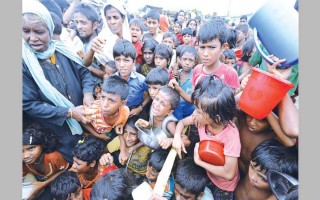UNACCOMPANIED ROHINGYA CHILDREN Number crosses 5,000
A growing number of Rohingya children have been desperately searching for their parents and other near and dear ones after arriving in Cox’s Bazaar.
They were separated from parents and relatives in the aftermath of violence in Myanmar’s Rakhine province.
Weary, traumatized and vulnerable these hapless children entered Bangladesh to flee ethnic violence, persecution, torture and arson attacks and brutal murder.
They had to cross difficult hilly terrain, muddy paths and even the rough sea before being able to enter Bangladesh if they were lucky enough and the less fortunate perished on the way.
The survivors are passing their days in severe agony, said aid workers.
Their travails are far from over even after entering Bangladesh.
They continue to be exposed to violence, abuse, sexual harassment, child labour and exploitation UNICEF Bangladesh spokesperson AM Sakil Faizullah told New Age.
They also face high risks of child marriage and being trafficked, he said.
According to UN estimates, aid groups registered 5,198 separated and unaccompanied Rohingya children.
UN’s joint response plan for Rohingya humanitarian crisis for the period of March –December 2018 was unveiled Friday.
According to the situation report of the Inter Sector Coordination Group, a combine of UN agencies and international humanitarian groups working to address the Rohingya crisis in Cox’s Bazaar, released on November 4 the number of unaccompanied and separated Rohingya children stand at 2,138.
The group’s situation report released on September 11 put the figure at 925.
Available data show that more girls than boys were separated and became unaccompanied raising concern as girls are particularly vulnerable to abuse, violence, sexual exploitation and neglect, said the joint response plan.
A majority of the Rohingya families are experiencing profound stress as some neighbors opened their homes to unaccompanied boys and girls, it said.
The response plan promised to strengthen identification and documentation, family tracing services, case management and provision of appropriate alternative family or community-based care for the unaccompanied children.
According to the UN joint response plan thousands of Rohingya boys and girls had been separated from their parents or primary caregivers when they fled for safety.
Child protection agencies registered 5,198 unaccompanied and separated children, but the UN expressed fears that the number of children who are missing or looking for their parents would be much higher.
According to the UN estimates, 6,88,500 Rohingyas entered Bangladesh since August 25, 2017 when the new wave of influx began.
The UN called it the world’s fastest-developing refugee emergency.
According to UNICEF estimates about 60 per cent of the Rohingya refugees in Bangladesh are children.
Myanmar army’s ethnic cleansing operations against the minority Rohingya set of their latest wave of exodus since August 25.
The UN identified Myanmar army’s actions against the Rohingyas as ‘ethnic cleansing.’
Bangladesh government’s Social Services Department registered 36,373 orphaned Rohingya children, 17,395 boys and 18,978 girls, between September and November 2017.
News Courtesy: www.newagebd.net











